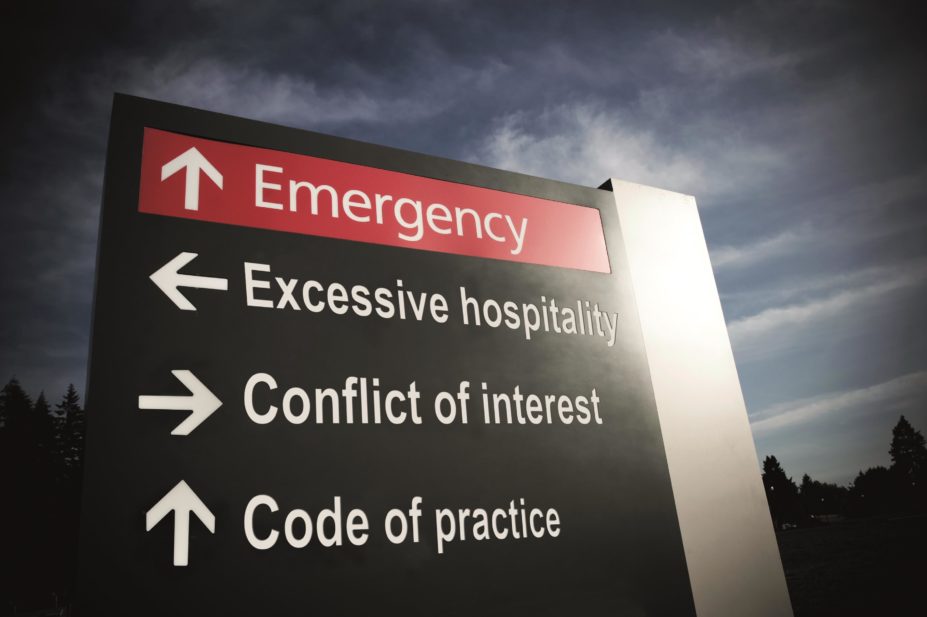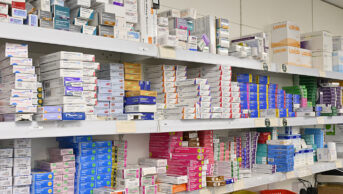
istockphoto.com / MAG
The Committee on Standards in Public Life is an advisory non-departmental public body of the UK government. It examines the conduct of all holders of public office in the UK. It produced the Nolan Principles[1]
, which tell us it is the perception of conflicts of interest that counts. So, if you consume large quantities of champagne at the expense of a pharmaceutical company or stay in a hotel with gold-plated waste bins while also being paid to attend an advisory board meeting then not only could you be accused of being in breach of NHS guidelines[2],[3]
but the public is likely to be suspicious about the necessity of this expense. Such hospitality by a pharmaceutical company is probably also a breach of the Association of the British Pharmaceutical Industry’s (ABPI) code of practice, which cites excessive hospitality as an example of something that could bring discredit on the industry[4]
. What constitutes “proportional and reasonable hospitality” in NHS guidance should be common sense. The Ministry of Justice has issued guidance on the Bribery Act 2010[5]
, which helps clarify what constitutes ‘reasonable and proportionate’ hospitality — dependent on the industry norm in each sector — and the kind of procedures that companies should have in place as a defence against charges of failing to prevent bribery.
Declaration of interest
In July 2015, The
Telegraph published an investigation that found “evidence of senior NHS staff being taken on expensive trips by companies lobbying to promote the use of their drugs”[6]
. Subsequently, in August 2015, health secretary Jeremy Hunt announced plans to introduce a ‘sunshine rule’, which will be written into the 2016–2017 NHS standard contract. The term ‘sunshine’ was lifted from the Sunshine Act in the United States that legislates for transparency in relationships with healthcare professionals to uncover potential conflicts of interest.
The sunshine rule will be mandatory for all healthcare workers to declare any gifts received from pharmaceutical companies. NHS organisations will also have to keep an up-to-date hospitality register detailing all hospitality and gifts received from pharmaceutical and medical device companies.
Working with pharma
A positive relationship between the NHS and the pharmaceutical industry is conducive to good healthcare. No one knows more about their products than the companies that developed them, and a dialogue between the two helps ensure that these medical products are marketed and prescribed appropriately and safely to optimise patient care and address an unmet need. It is important to extract maximum value from a product, and an advisory board determining a product’s strengths and weaknesses can improve the chances of this happening.
The advice given may include helping a manufacturer navigate through the complexities of the NHS and its market environment, and suggested improvements to product presentation and medicine labelling. It is not an unreasonable proposition to pay NHS staff for work done on such advisory boards, but this must be declared to NHS Employers. It is no excuse for a member of NHS staff to claim the work was undertaken during personal time. Full declarations are needed and the sunshine rule now requires this to include details of any hospitality, gifts and payments provided.
Ulterior motive
Recently, the Prescription Medicines Code of Practice Authority (PMCPA) — the self-regulatory, not-for-profit body that administers the ABPI’s code of practice for the pharmaceutical industry at arm’s length of the ABPI — reported[7]
on a case in which a pharmaceutical company hosted an advisory board meeting in Milan, Italy. Delegates were paid a fee to attend. However, the advisory board consisted of more than 100 delegates, making it more like a symposium than an advisory board meeting. There is no doubt that attending an advisory board meeting increases knowledge and awareness of a product but if there is no defined advice provided to the manufacturer then it may suggest the company has an ulterior motive.
Like focus groups, advisory boards are a good way of facilitating dialogue between companies and healthcare professionals but they must be undertaken in a manner consistent with NHS, ABPI and individual company rules. They must not be used as a mechanism to promote a new pharmaceutical product and if attendees believe this is the case they have a public and professional duty to complain and report it to the PMCPA.
Too much guidance
It is well known that the more guidance there is on a practice the more confusion and ambiguity there will be. Each pharmaceutical company has its own guidance, the ABPI issues guidance and the NHS has several other guidance documents.
There appears to be a significant number of people in the pharmacy profession who are unaware of the regulatory framework for interacting with the pharmaceutical industry
Whether the plethora of guidance supports, confuses or scares off NHS professionals needs to be assessed. There appears to be a significant number of people in the pharmacy profession who are unaware of the regulatory framework for interacting with the pharmaceutical industry.
An update of guidance is needed, such a as a composite of relevant NHS documents that take into account the Bribery Act, Nolan principles and the sunshine rule. It would be helpful for there to be some consistency in the documentation used to record declarations of interest across NHS organisations. The update of guidance should be carried out by NHS England in collaboration with the medical and pharmaceutical professions, plus representatives from the ABPI. This would help to reinforce regulations to NHS staff, including what needs to be recorded, and hopefully this would avert the need for journalists to do their own research through Freedom of Information requests and honey traps.
Getting its act together
The ABPI has welcomed the recent sunshine rule proposals as a positive addition to existing industry-led drives for disclosure and transparency around industry relationships with healthcare professionals. From June 2016, “payments and transfer of value” made by the industry to individual healthcare professionals and organisations will be available on a single, searchable database hosted by the ABPI. The ABPI code already exceeds the legal requirements of the Bribery Act 2010 on issues such as hospitality and transparency. More recently it has produced helpful documents for the NHS relating to the sunshine rule (including an explanatory letter, frequently asked questions and tips for organisations).
It is worth questioning whether NHS and trust guidelines should form part of mandatory induction programmes for pharmacy staff or other relevant NHS employees. Why do we have such variability in processes for declarations of interest and associated paperwork when regulations apply across the NHS? Given the plethora of guidance, it is time some attention is given to consistency of record keeping and making sure guidance from all parties sends the same message. If the NHS does not provide greater clarification and support, some healthcare professionals may unwittingly not comply with regulations and have their role on important advisory boards undermined.
Ron Pate undertakes consultancy roles for the NHS and pharmaceutical industry.
References
[1] Committee on Standards in Public Life. The 7 principles of public life. 31 May 1995.
[2] Business Services Authority. Standards of business conduct procedure. April 2010.
[3] Department of Health. Commercial sponsorship – ethical standards for the NHS. November 2000.
[4] Prescription Medicines Code of Practice Authority. ABPI code of practice for the pharmaceutical industry 2015.
[5] Ministry of Justice. Guidance about commercial organisations preventing bribery (section 9 of the Bribery Act 2010).
[6] Heighton L, Malnick E, Newall C et al. Lavish trips laid on by drugs firms to ‘sway’ NHS staff. The Telegraph 22 July 2015.
[7] Prescription Medicines Code of Practice Authority. Astellas Pharma Europe Ltd named in advertisements for breaches of the ABPI code of practice. 4 September 2015.


